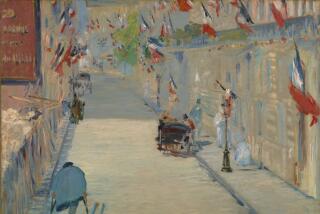Book Review : H. G. Wells’ Odd Impressions of the U.S.
- Share via
The Future in America by H. G. Wells (St. Martin’s Press: $16.95; 194 pages)
In 1906, H. G. Wells set sail on a Cunarder to see America. In climbing aboard that gangplank, he was joining a distinguished parade including de Tocqueville, Harriet Martineau, Mrs. Trollope, Dickens, Frederika Bremer; all of whom had made the essential pilgrimage and written the mandatory book about our manners and morals, economics and politics; each successive observer finding new astonishments. While the women tended to concentrate upon our lack of couth, emphasizing spittoons, alcoholism and bad cooking, the men pontificated upon more weighty matters; government, race relations, galloping materialism.
During the 18th and 19th centuries, America was one vast goldfish bowl against which Europe pressed its nose, entertained, appalled and impressed by turns.
A Quaint, Astute Journal
Though Americans who could afford the expense took the grand tour of Europe to acquire polish and sophistication, Europeans came here to see how most of us were getting along without either. St. Martin’s has reissued Wells’ quaint, dated, but often astute journal as the fourth in a series of these visitors’ commentaries. Originally written for Harper’s Weekly magazine in some haste, Wells reminds us that the essays weren’t meant to be definitive or comprehensive; merely impressionistic. He actually visited only a small part of the country, limiting himself to New York, Washington, Chicago and Paterson, N. J., with a few minor side trips, but he listened carefully and gave serious consideration to whatever he’d seen and heard, filling the gaps with extrapolation.
Because he was uncommonly curious, perceptive and open-minded, the book often surmounts its limitations to show contemporary readers a nation in which most problems not only seemed solvable but actually were. To read it now is to be overcome by nostalgia for a time in which legislation, money, technology, education or sheer good will could cure almost all social ills.
Wells was horrified by child labor, still rampant in America’s factories and mills, though long since abolished in England. Then as now, the country was inundated by waves of immigrants, and like other observers before him, Wells was amazed at the ease with which these foreigners were absorbed into American life. The parents immediately found work, the children responded wonderfully to education. Wells glides over the slums and sweatshops, the exploitation and bigotry, persuading himself that these temporary inconveniences are little more than necessary hurdles on the success steeplechase.
Some Unthinkable Attitudes
His attitude toward the black minority is fascinating because it seems not only eccentric but also utterly unthinkable. While he deplores the treatment accorded black people, his compassion is based upon the fact that most of them are at least partly white and therefore deserve better. After meeting and talking earnestly with Booker T. Washington, Wells was most favorably impressed by the doctrine of separate but equal facilities. Washington, however, seems to be the only black person whom he came to know on his visit; the rest of his comments based only on hearsay.
He found New York “stimulating, significant, and beautiful”; the new skyscrapers and bridges romantic triumphs of engineering, the atmosphere delightfully free of London’s pall of smoke. He’s thrilled by the speed, excited by the crowds, only mildly disconcerted by the accompanying noise. Wells is favorably impressed by the efficiency with which Ellis Island processes the incoming hordes--”a string of human beads”; indifferent to Niagara Falls--”a thunderous impressive accessory to the artless love-making that fills the surrounding hotels,” and thoroughly appalled by the grimy mills of Paterson.
Prepared to believe we’re a classless society, he accepts that notion, noting the absence of either a peasantry or a true aristocracy. “The American community . . . does not correspond to an entire European community at all, but only to the middle masses of it. It is the central part of the European organism without either the dreaming head or the subjugated feet.” Charmed by Boston, he nevertheless finds the city “mysteriously enchanted and ineffectual,” lost in memories of vanished glory. Washington disappoints him; all talk and little action, wasting energy on small matters and begging the large questions.
Optimism, Then Doubts
Steaming away, back to his tranquil English seaside garden, he glimpses the New York skyline, like “packing cases outside a warehouse,” believing for an instant that “presently out of these would come the real right thing, palaces and noble places, free, high circumstances, space and leisure, light and fine living for the sons of men.” Home again, his exuberant optimism gives way to grave doubts.
“These people are the finest people upon earth--the most hopeful. But they are vain and hasty; they are thoughtless, harsh and undisciplined. In the end, it may be, they will accomplish nothing.”
Finally, like the America watchers who preceded and would follow him, he decides that the only way to come to grips with the enormity of America is to wait and see what we make of it by 1977--his target date.
More to Read
Sign up for our Book Club newsletter
Get the latest news, events and more from the Los Angeles Times Book Club, and help us get L.A. reading and talking.
You may occasionally receive promotional content from the Los Angeles Times.








